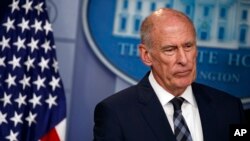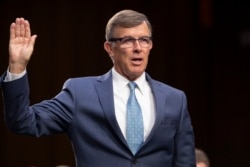Updated Aug. 15, 4:37 p.m.
Washington's top two intelligence officials spent their last day on the job Thursday, leaving the nation's spy agencies in the hands of an acting director as U.S. President Donald Trump moves ahead with an overhaul of the country's intelligence leadership.
The departures of Director of National Intelligence Dan Coats and his top deputy, Sue Gordon, come as tensions rise between China and a protest movement in Hong Kong, and while other potential crises simmer in the Persian Gulf, on the Korean Peninsula and elsewhere.
Trump announced Coats’ resignation on Twitter late last month and followed up less than two weeks later with a tweet about the resignation of Principal Deputy Director of National Intelligence Sue Gordon, who had been in line to become the acting director.
But in a note accompanying her resignation letter, Gordon made clear her departure was an “act of respect & patriotism, not preference.”
"Simply put, I love America," Gordon said in a farewell letter to the U.S. intelligence community posted Thursday on Twitter.
"What we do makes a difference," she wrote. "Remember why we work so tirelessly, and all will be well."
Also Thursday, Secretary of State Mike Pompeo, who previously served as the nation's top spymaster at the Central Intelligence Agency, praised Coats for his tenure as the country's lead intelligence official.
"You strengthened the capabilities of our Intelligence Community," Pompeo tweeted.
Trump selected Coats, a former Republican lawmaker and one-time U.S. ambassador to Germany, to be his top intelligence official shortly after taking office.
But while Coats quickly won praise from lawmakers and veterans in the U.S. intelligence community for “speaking truth to power,” his public assessments repeatedly clashed with the president’s own assertions.
Read also: US Intel Chiefs Warn Washington Risks Losing Friends, Influence
Most recently, Coats and other U.S. intelligence chiefs stoked Trump’s ire this past January when they testified before Congress, contradicting the president’s assessment of Iran, of U.S. efforts to denuclearize North Korea as well as the president’s declarations that the Islamic State terror group had been defeated.
In a series of tweets, Trump declared Coats and the others, “are wrong!” and further suggested, “Perhaps Intelligence should go back to school!"
Coats also publicly split with the president in July of last year, when he told an audience at a security forum that Trump’s decision to meet alone with top Russian officials at the White House was, “probably not the best thing to do."
For now, the U.S. intelligence community will be led by Joseph Maguire, a retired admiral and former Navy SEAL, who until now had been serving as director of the National Counterterrorism Center (NCTC).
Maguire has garnered praise both from intelligence officials, including Coats, and from key lawmakers.
“The president seems to like Maguire,” said Fred Feitz, the president of the Center for Security Policy and a former CIA analyst.
“I think there will be a good relationship,” Fleitz said, adding Maguire has the ability to “provide the intelligence to the president that he needs to hear."
And Fleitz, who told VOA he has already interviewed to be the next national intelligence director, said no matter who Trump ultimately selects, he or she will be held to the same standard.
“The president knows the purpose of the intelligence community and he's determined that it provides him with the information he needs to keep our nation safe," he said.
During his NCTC confirmation hearing before the Senate Intelligence Committee last year, Maguire assured lawmakers he would not allow politics to influence how intelligence would be presented to the president.
"I am more than willing to speak truth to power," he said told lawmaker at the hearing last year. “To color and shape the information to please other folks would be a disservice."
Before naming Maguire as his acting director of national intelligence, Trump announced he planned to nominate Republican Congressman John Ratcliffe to the post. But Ratcliffe withdrew his nomination days later, following growing questions about his credentials and experience.
Read also: Trump's Pick for National Intelligence Director Withdraws
Trump has said he is considering several candidates to serve as a permanent director of national intelligence, but told reporters last week, “I'm in no rush because we have a great acting [director].”
“That's a job that everybody wants, DNI. Everybody” Trump said. “We'll come up with somebody that's great. We have a lot of choice. A lot of people want the job.”
Reaction from Intelligence Community
Despite such assurances, some former U.S. intelligence officials are leery of who might end up in the job given the way Coats and Gordon were shown the door.
"It suggests that the president is looking for people who are going to tell him what he wants to hear," Larry Pfeiffer, a former CIA chief of staff and former senior director of the White House Situation Room, told VOA.
Some politicians and lobbyists may even see such a move as necessary.
"I think there is a class of people in this town who just can't fathom that there are people who can do that job in a honest way," Pfeiffer said.
In an opinion piece published Thursday by The Hill, a former chair and a former ranking member of the House Intelligence Committee said regardless of party, the injection of politics into the way the country’s intelligence agencies are run is worrisome.
“Playing political games with the leadership of the intelligence community is setting a dangerous precedent for the future, where this and successive administrations will only be told what they want to hear or what the intelligence community believes they want to hear,” wrote former Republican Congressman Mike Rogers and current Democrat Congressman Dutch Ruppersberger. “That is something we cannot afford.”






